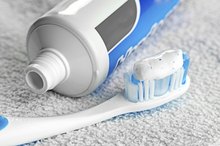What does fact checked mean?
At Healthfully, we strive to deliver objective content that is accurate and up-to-date. Our team periodically reviews articles in order to ensure content quality. The sources cited below consist of evidence from peer-reviewed journals, prominent medical organizations, academic associations, and government data.
- U.S. Department of Health and Human Services: Bisphenol A (BPA) Information for Parents
- U.S. Food and Drug Administration: pdate on Bisphenol A for Use in Food Contact Applications
The information contained on this site is for informational purposes only, and should not be used as a substitute for the advice of a professional health care provider. Please check with the appropriate physician regarding health questions and concerns. Although we strive to deliver accurate and up-to-date information, no guarantee to that effect is made.
What Brands of Bottled Water Don't Have BPA in Them?
Bisphenol A, or BPA, is a chemical used for decades to manufacture hard plastics, particularly water bottles, baby bottles, reusable cups and the lining of metal cans 2. Studies from the U.S. Food and Drug Administration claim the chemical in food containers does not affect children or adults 4.
In fact, the department's 2010 "Update on Bisphenol A for Use in Food Contact Applications" assures citizens that the FDA has been carefully monitoring BPA and reducing exposure 14. However, Europe has gone so far as to ban all products made for children under the age of three that contain BPA (in 2006). Presumably, BPA levels would be just enough to affect small children and undeveloped brain functions, but would not affect more mature bodies. Fortunately, changing technology and plastic developments have put many excellent BPA-free plastic bottles on the market recently.
What is BPA?
Bisphenol A is a xenoestrogen, or “hormone disrupter.” According to medical experts at "Trusted, M.D.," synthetic xenoestrogens can be crippling to young children and infants--and are linked to decreased testosterone levels in men, insulin resistance and Type 2 Diabetes, and breast cancer and uterine cancer in women.
**Although the FDA claims the chemical does not affect children or adults in "Update on Bisphenol A for Use in Food Contact Applications, 2010," it has admitted "some concern for effects on the brain, behavior and prostate glands of fetuses and the very young.
"** Scientific studies have also raised concerns about the chemical's link to breast and prostate cancer, diabetes, obesity, heart disease, reproductive failures and behavioral problems, according to a "Milwaukee Journal-Sentinal" report in 2010, based on statements from the FDA website 4. In 2006, San Francisco followed Europe's lead and banned BPA products made for children under age three.
You can tell whether your bottle contains BPA or not by looking at the bottom of it--#2 HDPE (high-density polyethylene), #4 LDPE (low-density polyethylene), or #5 PP (polypropylene) means your bottle is fine. A #1 is recommended for one-time use. Unfortunately, some of the fun, colorful bottles so pervasive on the market today often contain polycarbonate plastics. You can identify them by the #7 recycling symbol.
Read more about how to tell if plastic is BPA free.
- Bisphenol A is a xenoestrogen, or “hormone disrupter.” Although the FDA claims the chemical does not affect children or adults in "Update on Bisphenol A for Use in Food Contact Applications, 2010," it has admitted "some concern for effects on the brain, behavior and prostate glands of fetuses and the very young.
- "
Stainless Steel
How to Tell If Plastic Is BPA Free
Learn More
Klean Kanteen is a company providing alternatives to plastic that contains BPA or controversial aluminum bottles. It manufactures stainless steel containers in various sizes, shapes, and styles. Other premium choices for stainless steel bottles include:
- Intak by Thermos Stainless Steel Hydration Bottle
- Reduce Stainless Steel Water Bottles (plastic lid)
- Nalgene Backpacker Stainless Steel
- Gaiam Stainless Steel Water Bottle
- Klean Kanteen is a company providing alternatives to plastic that contains BPA or controversial aluminum bottles.
- Nalgene Backpacker Stainless Steel](https://www.amazon.com/Nalgene-Backpacker-Stainless-Steel-Bottle/dp/B001GSQOCS/) 4.
- [
Polyethylene Plastic
Polyethylene is a plastic manufactured without BPA.This type of bottle is durable and easy to clean; however, it's manufactured and tested carefully to ensure no trace of BPA. Depending on the brand and style of bottle, these choices are varied in their colors and features, but share common characteristics of safety and affordability.
Product Architects Inc. Polar Bottle 3. FuelBelt
- Polyethylene is a plastic manufactured without BPA.This type of bottle is durable and easy to clean; however, it's manufactured and tested carefully to ensure no trace of BPA.
Eastman Tritan Plastic
Chemicals in Sanitary Pads
Learn More
Eastman Tritan plastic is another material that claims to be BPA-free because of its copolyester makeup. Various manufacturers create bottles using this substance, including the following:
CamelBak Better Bottle 5. Contigo Hydration Water Bottle
- Eastman Tritan plastic is another material that claims to be BPA-free because of its copolyester makeup.
- Intake by Thermos Beverage Bottle](https://www.thermos.com/drink/water-bottles.html) 3.
- [
Other Alternatives
Other BPA-plastic alternatives include aluminum bottles with non-BPA plastic liners, such as Sigg's Lifestyle water bottles.
Reduce WaterWeek, a popular beverage container, features ABS plastic with a polypropylene cap and is a recommended choice for BPA-free users. These bottles can be obtained from wholesalers, stores, or directly from the manufacturer.
Read more about the dangers of plastic food storage containers.
- Other BPA-plastic alternatives include aluminum bottles with non-BPA plastic liners, such as Sigg's Lifestyle water bottles.
Related Articles
References
- U.S. Department of Health and Human Services: Bisphenol A (BPA) Information for Parents
- Good Housekeeping: Best Reusable Water Bottles
- "Milwaukee-Wisconsin Journal-Sentinal"; FDA Says its Unable to Regulate BPA; Meg Kissinger; January 2010
- U.S. Food and Drug Administration: pdate on Bisphenol A for Use in Food Contact Applications
- Safe Mama: Gerber Baby Food and Number 7 Plastics
- Welle F, Franz R. Migration of antimony from PET bottles into beverages: Determination of the activation energy of diffusion and migration modelling compared with literature data. Food Addit Contam Part A Chem Anal Control Expo Risk Assess. 2011;28(1):115-26. doi:10.1080/19440049.2010.530296
- Bach C, Dauchy X, Chagnon M-C, Etienne S. Chemical compounds and toxicological assessments of drinking water stored in polyethylene terephthalate (PET) bottles: A source of controversy reviewed. Water Research. 2012;46(3):571-583. doi:10.1016/j.watres.2011.11.062
- Raj SD. Bottled water: How safe is it?. Water Environ Res. 2005;77(7):3013-8.
- Lilya, D. Environmental Engineering Program. Society for Risk Analysis 2001 Annual Meeting.
Writer Bio
Rebecca High graduated from Cedarville University, with a B.A. in international studies. As a university student she wrote and edited for "Cedars," the campus newspaper, and was published twice in the "Kamelian," the literary journal of Kishwaukee Community College. She attended the World Journalism Institute convergence course 2009 taught by journalists including Pulitzer Prize-winning Manny Garcia. She has written reviews for Sazze.com









